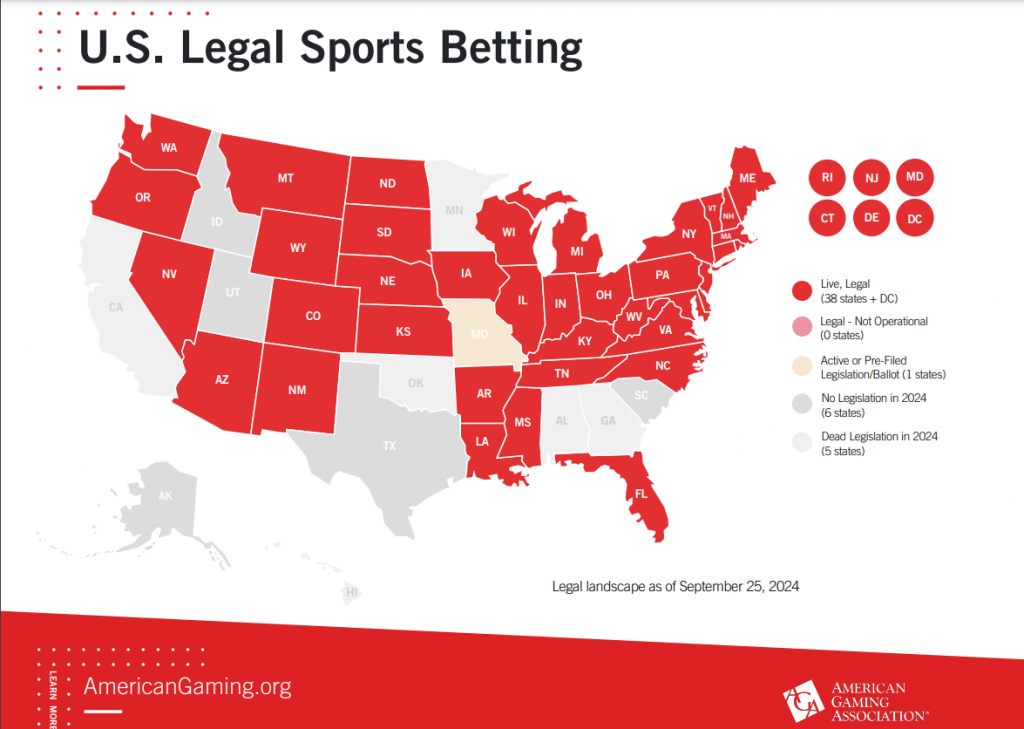
Casino Game Script, Plugins, Code & Templates
Explore how casino game script features like user management, payment systems integration, and customization options boost online gambling.
PAM

Fantasy Sports Platform

Opinion Trading

Casino Games

Telegram Games

Crash Games

Poker

Rummy

Roulette

Blackjack

Slots

Poker

Rummy

Roulette

Blackjack

Slots

HTML5 Games

Mobile games

PC games

Console Games

Web3 Games

AR/VR Games

Custom Game Development

Metaverse Game Development

Ludo game Development

XR/AR/VR Solutions

Social media filters


If you’re an online casino operator or game developer in the U.S., knowing where online gambling is legal in 2024 is vital for your business. With laws constantly changing, it’s important to understand which states allow online casinos, sports betting, and lotteries.
This blog will provide a clear overview of the current legal status across various states and point out potential markets for expansion. You’ll also find practical tips for navigating legal requirements. By staying informed, you can make better decisions for your business. Let’s dive in!
Understanding Online Gambling in the U.S.
Online gambling in the U.S. has a rich and complex history, evolving significantly. It began in the early 2000s, but federal regulations like the Unlawful Internet Gambling Enforcement Act (UIGEA) of 2006 posed significant challenges. This act made it tough for operators by prohibiting payment processing for specific gambling activities. The Federal Wire Act of 1961 also complicated things, impacting online gaming operations unexpectedly.

Despite these obstacles, pioneers like Nevada, Delaware, and New Jersey stepped up, allowing limited forms of legal online gambling. Then, in 2018, a pivotal moment occurred when the Supreme Court overturned the Professional and Amateur Sports Protection Act (PASPA). This ruling enabled states to create their own sports betting regulations, leading to swift legalisations in states like New Jersey and Michigan.
Now, in 2024, we see a transformed landscape with states actively embracing online gambling. This information is crucial for you as an online casino operator or game developer. Understanding these changes helps you identify opportunities for growth and navigate the evolving market.
Supporting Sources: Murphy vs. NCAA Supreme Court Ruling
States with Legal Online Casinos
Now that we’ve explored the history of online gambling in the U.S., let’s look at the states where online casinos are fully operational. Understanding these markets can help you identify opportunities for your business. Here’s a breakdown of key states leading the way in online gambling:
With these insights, you can see the opportunities available in these states. Understanding where online casinos operate legally can guide your strategy and help you tap into this growing market. Let’s continue exploring the states that allow online sports betting!
As we explore the current state of online gambling, let’s focus on the exciting growth of online sports betting in the U.S. Since the repeal of the Professional and Amateur Sports Protection Act (PASPA) in 2018; online sports betting has become a significant part of the gaming industry.

A total of 35 states have legalized online sports betting, each creating its own rules and regulations. This shift has opened up numerous opportunities, and states have tailored their approaches to meet local demands.
Economic Impact and Trends
States are recognising the financial benefits of legalising online sports betting. For instance, Pennsylvania reported a 29.63% increase in sports wagering revenue, reaching nearly $29.9 million as of June 2024 (source: Pennsylvania Gaming Control Board).
The expansion of online sports betting reflects a growing acceptance of these activities, with states implementing unique regulations while trying to standardize their approaches. Recent developments, such as Rhode Island’s entry into sports betting, highlight the ongoing evolution in this space. With plans to introduce online casinos, Rhode Island shows how states are transforming their gaming options.
As an operator, staying informed about these varying regulations and market dynamics is crucial for successfully entering and thriving in this competitive environment.
States with Legal Online Lottery
While only a few states in the U.S. offer online lottery services, those that do are reaping significant benefits. Here are the eight states leading the way, each with its unique approach:

The DOJ’s 2011 reinterpretation of the Wire Act, which applies only to sports betting, has opened the door for states to legislate online lotteries. The growing presence of online lotteries shows how states are capitalizing on this revenue stream. This trend raises the question: which states might legalize online gambling next?
As an operator or developer, understanding these opportunities can help you plan effectively in this changing market. Whether you’re considering launching an online lottery or partnering with existing platforms, staying informed about state regulations is essential. Let’s now look at the states that are likely to legalize online gambling in the near future!
As states recognize the economic benefits of online gambling, several are considering changes to their laws. These are some states that may soon legalize online gambling:
A national trend toward online gambling is becoming evident, reflecting increased acceptance across various states. As an operator or developer, staying informed about these changes can help you identify opportunities in this evolving market.
For more insights into the dynamics of online gambling in states where it is yet to be legalized, interested readers can explore this Reddit discussion.
Challenges and States Where Online Gambling Remains Illegal
Despite the rising popularity and potential economic benefits of online gambling, several U.S. states continue to enforce strict prohibitions against it for various reasons. Here’s a look at four major states with significant restrictions:

While some states maintain strict anti-gambling positions, organizations like the National Council on Problem Gambling (NCPG) are actively promoting responsible gambling practices. Their efforts may eventually influence legislative changes in states currently opposed to online gambling. For more insights on state-specific gambling laws, check out this discussion on Reddit.
Tips for Entering the iGaming Market
As states like New York and Kentucky move toward legalising various forms of online gambling, the iGaming market is expanding rapidly. If you’re considering entering this space, careful planning and strategy are key. Here are some essential tips to help you succeed.
Every state has its own rules, tax structures, and operational requirements. For example, Pennsylvania has high licensing fees, while New Jersey requires partnerships with existing brick-and-mortar casinos. Staying informed about these regulations is crucial to ensure your venture is feasible and profitable. Since legislation constantly evolves, keeping an eye on potential changes is vital. For instance, Rhode Island’s recent move to introduce online casinos in 2024 shows a trend that other states may follow.
Collaborating with experienced development companies like Source Code Lab can greatly enhance your game offerings and help you maintain compliance with state regulations. These partnerships can ease the burden of operational complexities and allow you to adapt to changing legal environments more efficiently.
Check out how custom game development can elevate your gaming platform.
A seamless user experience is essential, especially since mobile gaming accounts for over 70% of online gambling. Ensure your platform features a user-friendly mobile interface and a diverse selection of games, including slots and live dealer options, to cater to different player preferences. If you need help with your game development process, consider partnering with experts in the field.
Security should be at the forefront of your operations. Implement robust measures like SSL encryption and certified random number generators to ensure fair play. Building player trust is critical for long-term success.
Player protection is crucial. Incorporate tools for responsible gambling, such as setting deposit limits and offering self-exclusion options. These measures not only help your players but also demonstrate your commitment to regulatory compliance.
Conclusion
The online gambling landscape in the U.S. is changing fast. For online casino operators and game developers, it’s crucial to know where online gambling is legal and to keep up with state regulations. With states like New Jersey and Michigan leading the charge, there are plenty of growth opportunities, but entering this market requires careful planning.
To succeed, stay informed about regulations, partner with experienced development companies, enhance user experience, and prioritise responsible gambling. These steps are vital for ensuring compliance and building a successful online gambling business.
If you’re ready to seize the opportunities in the iGaming market, partnering with Source Code Lab is your best move. We specialise in game development and compliance, providing you with the expertise and resources needed to navigate this complex industry. Our team can help you create engaging games that meet regulatory requirements while delivering an outstanding user experience. Let us help you turn your vision into reality and successfully navigate the exciting world of online gambling.
Contact us today to get started!
States like New Jersey, Michigan, Pennsylvania, and Delaware have fully operational online casinos. Additionally, 35 states have legalized online sports betting.
Each state has its own rules, licensing fees, and tax structures. Knowing these regulations helps ensure your business remains compliant and profitable.
Start by researching state regulations, considering partnerships with development companies, prioritizing user experience, and implementing responsible gambling measures.
Source Code Lab specializes in game development and compliance, helping operators create engaging games that meet regulatory requirements.
Incorporate tools like deposit limits, self-exclusion options, and resources for players to help them gamble responsibly.
Legalizing online gambling can generate significant tax revenue and create jobs, contributing positively to local economies.

Explore how casino game script features like user management, payment systems integration, and customization options boost online gambling.

Explore top user-friendly online casino for roulette enthusiasts with ease of navigation, device accessibility, and a simple registration process.

Understanding the demographics, regional differences, and gaming preferences helps in defining the online casino audience profiles effectively.
Lorem ipsum dolor sit amet, consectetur adipiscing elit. Ut elit tellus, luctus nec ullamcorper mattis, pulvinar dapibus leo.







